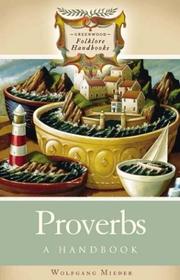| Listing 1 - 10 of 27 | << page >> |
Sort by
|
Book
ISBN: 8024643693 9788024643694 9788024643588 8024643588 Year: 2019 Publisher: Prague, Czech Republic : Charles University, Karolinum Press,
Abstract | Keywords | Export | Availability | Bookmark
 Loading...
Loading...Choose an application
- Reference Manager
- EndNote
- RefWorks (Direct export to RefWorks)
Pole výzkumu paremiologie je mezioborové, prolíná se s folklórem, jazykem, literaturou, historií a dalšími vzájemně provázanými disciplínami. Kniha předkládá systematickou analýzu přísloví opřenou o korpusové nálezy a srovnává jejich lexikální, sémantické a pragmatické aspekty napříč různými jazyky. Přítomný soubor studií Františka Čermáka, tvůrce českého frazeologického slovníku, shrnuje výsledky jeho celoživotního bádání a předkládá je mezinárodní odborné veřejnosti
Proverbs --- Paremiology --- Paroemiology --- History and criticism.
Book
ISBN: 1628461403 132221798X 1628461411 1626740763 9781628461411 9781626740761 9781628461404 Year: 2014 Publisher: Jackson
Abstract | Keywords | Export | Availability | Bookmark
 Loading...
Loading...Choose an application
- Reference Manager
- EndNote
- RefWorks (Direct export to RefWorks)
"The thirteen chapters of this book comprise an intriguing and informative entry into the world of proverb scholarship, illustrating that proverbs have always been and continue to be wisdom's international currency. The first section of the book focuses on the field of paremiology (proverb studies) in general, the spread of Anglo-American proverbs in Europe, and the phenomenon of modern proverbs. The second section analyzes the use of proverbs in the world of politics, including a chapter on President Obama, while the third concentrates on the uses of proverbs in literature. The final section ends with detailed cultural studies of the origin, history, dissemination, use, function, and meaning of specific proverbs.Noted scholar Wolfgang Mieder shows that proverbs matter in culture, literature, and politics. Proverbs remain part and parcel of oral and written communication, and, he demonstrates, they deserve to be studied from a range of viewpoints. While various chapters deal with a variety of issues and approaches, they cohere through a rhetorical perspective that looks at the text, texture, and context of proverbs as speech acts that make a noteworthy impact on culture and society. Whether proverbs appear in everyday speech, on the radio, on television, in films, on the pages of newspapers or magazines, in advertisements, in literary works, or in political speeches, they serve as formulaic verbal devices to add authoritative weight through tradition, convention, and wisdom"--
Proverbs --- History and criticism. --- Paremiology --- Paroemiology

ISBN: 0313326983 Year: 2004 Publisher: Westport, Conn. : Greenwood Press,
Abstract | Keywords | Export | Availability | Bookmark
 Loading...
Loading...Choose an application
- Reference Manager
- EndNote
- RefWorks (Direct export to RefWorks)
Proverbs --- Proverbes --- History and criticism. --- Histoire et critique --- Paremiology --- Paroemiology --- History and criticism
Book
ISBN: 9780977073153 0977073157 Year: 2007 Volume: 23 Publisher: Burlington: University of Vermont,
Abstract | Keywords | Export | Availability | Bookmark
 Loading...
Loading...Choose an application
- Reference Manager
- EndNote
- RefWorks (Direct export to RefWorks)
Proverbs --- History and criticism. --- Paremiology --- Paroemiology --- History and criticism --- Proverbs - History and criticism.

ISBN: 0824094727 Year: 1981 Publisher: New York : Garland Publishing,
Abstract | Keywords | Export | Availability | Bookmark
 Loading...
Loading...Choose an application
- Reference Manager
- EndNote
- RefWorks (Direct export to RefWorks)
Proverbs --- #VCV monografie 1999 --- Paremiology --- Paroemiology --- History and criticism --- Proverbes --- History and criticism. --- Histoire et critique.
Book
ISBN: 1282716425 9786612716423 3110224895 9783110224894 9783110224887 3110224887 Year: 2010 Publisher: Berlin New York De Gruyter Mouton
Abstract | Keywords | Export | Availability | Bookmark
 Loading...
Loading...Choose an application
- Reference Manager
- EndNote
- RefWorks (Direct export to RefWorks)
Grounded primarily in the ethnography of communication and aligned with the multidisciplinarity of discourse analysis, the book examines the use of proverbs in the daily life of a social network of Mexican-origin transnational families in Chicago and Michoacán, Mexico. Various and detailed analyses of actual proverb use reveal that proverbs in this particular population function as a highly contextualized communicative strategy that serves four discrete social functions: to argue, to advise, to establish rapport, and to entertain. Proposing that the social and cognitive aspects of language use must be combined for a complete understanding of how such genres of language are actually used by regular people in daily life, the author shows how ordinary people use sophisticated cognitive processes to interpret the socially-relevant meanings of proverbs in everyday conversation. The book provides an unusual mix of contextualized discourse analysis that is ethnographic, linguistic, and cognitive, yielding much needed insight into a segment of the Mexican-origin population of the Midwestern U.S., a population whose increasing importance and size is often mentioned, but about which precious few linguistic studies have been conducted. The volume not only helps to fill this void but it is also one of the few studies that focuses on the impact of transnationalism on linguistic practices, regardless of cultural group. Departing from the conventional approach of ignoring the role of everyday-language use in order to focus exclusively on culture, economics, or migrant patterns, the book makes linguistic practice the central issue, and thus affirms that it is language that weaves together the two distant sites of transnational communities, providing a fertile area for understanding the perspectives of the transmigrants themselves.
Proverbs --- Discourse analysis. --- Discourse grammar --- Text grammar --- Semantics --- Semiotics --- Paremiology --- Paroemiology --- History and criticism. --- Discourse Analysis. --- Rhetorics. --- Social Cognition. --- Sociolinguistics.

ISBN: 3823360922 9783823360926 Year: 2004 Publisher: Tübingen Narr
Abstract | Keywords | Export | Availability | Bookmark
 Loading...
Loading...Choose an application
- Reference Manager
- EndNote
- RefWorks (Direct export to RefWorks)
Lexicology. Semantics --- Proverbs --- Terms and phrases --- Terminology --- Names --- Sublanguage --- Allusions --- Paremiology --- Paroemiology --- History and criticism --- Mieder, Wolfgang. --- Mieder, Wolfgang
Book
ISBN: 1282634011 9786612634017 9400600194 9789400600195 9789087281007 9087281005 9781282634015 6612634014 Year: 2010 Publisher: [Leiden] Leiden University Press
Abstract | Keywords | Export | Availability | Bookmark
 Loading...
Loading...Choose an application
- Reference Manager
- EndNote
- RefWorks (Direct export to RefWorks)
The book to bring together a fascinating compendium of witticisms on women-more than 15,000 sayings from around the globe and translated from more than 240 languages.
Proverbs. --- Proverbs --- Women --- Paremiology --- Paroemiology --- Adages --- Ana --- Gnomes (Maxims) --- Proverbial sayings --- Sayings --- Folk literature --- Quotations --- Terms and phrases --- Aphorisms and apothegms --- Epigrams --- Maxims --- History and criticism.
Book
ISBN: 1299252397 1442221305 9781442221307 9781442221291 1442221291 9781299252394 Year: 2013 Publisher: Lanham, [Maryland]
Abstract | Keywords | Export | Availability | Bookmark
 Loading...
Loading...Choose an application
- Reference Manager
- EndNote
- RefWorks (Direct export to RefWorks)
Whether in slogans, catchphrases, adages or proverbs, we encounter mottos every day, but we rarely take time to reflect on them. In Of Mottos and Morals: Simple Words for Complex Virtues, Martin explores the possibility that mottos themselves are worthy of serious thought, examining how they contribute to moral guidance and help us grapple with complexity.
Mottoes --- Slogans --- Proverbs --- Terms and phrases --- Terminology --- Names --- Sublanguage --- Allusions --- Paremiology --- Paroemiology --- Advertising --- Battle-cries --- Mottos --- Emblems --- Maxims --- Moral and ethical aspects. --- History and criticism. --- Social aspects.
Book
ISBN: 3030890619 3030890627 Year: 2021 Publisher: Cham, Switzerland : Palgrave Macmillan,
Abstract | Keywords | Export | Availability | Bookmark
 Loading...
Loading...Choose an application
- Reference Manager
- EndNote
- RefWorks (Direct export to RefWorks)
Chapter 1: The Comparative Study of Anti-Proverbs: An IntroductionPart I: Types of Proverb AlterationsChapter 2: Addition in Anti-ProverbsChapter 3: Omission in Anti-ProverbsChapter 4: Substitution in Anti-ProverbsChapter 5: Blending of ProverbsPart II: Anti-proverbs and Verbal HumorChapter 6: Punning in Anti-ProverbsChapter 7: Further Humor Devices as Used in Anti-ProverbsChapter 8: Summary and Implications for Further Research
Proverbs --- Language and languages in literature. --- Language and languages --- Foreign languages --- Languages --- Anthropology --- Communication --- Ethnology --- Information theory --- Meaning (Psychology) --- Philology --- Linguistics --- Paremiology --- Paroemiology --- History and criticism. --- Literature
| Listing 1 - 10 of 27 | << page >> |
Sort by
|

 Search
Search Feedback
Feedback About UniCat
About UniCat  Help
Help News
News